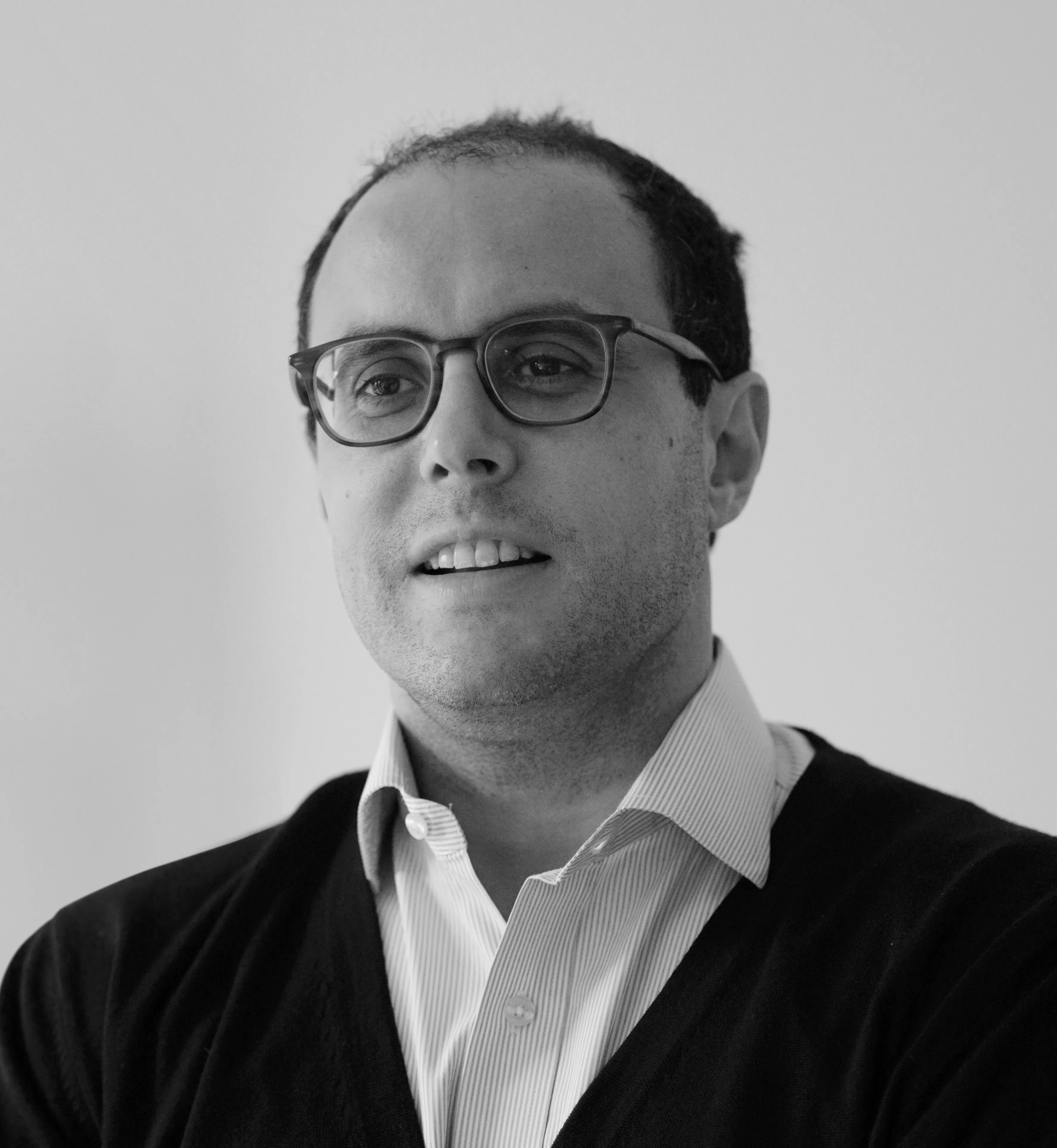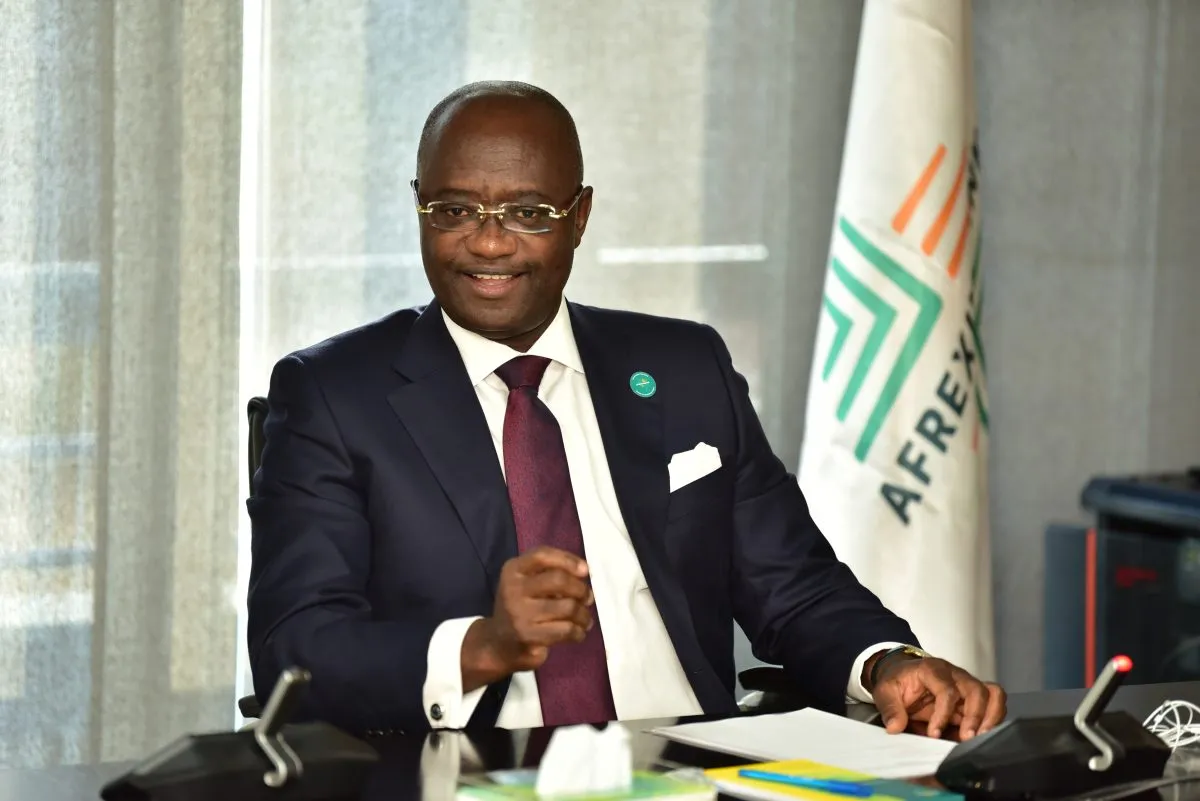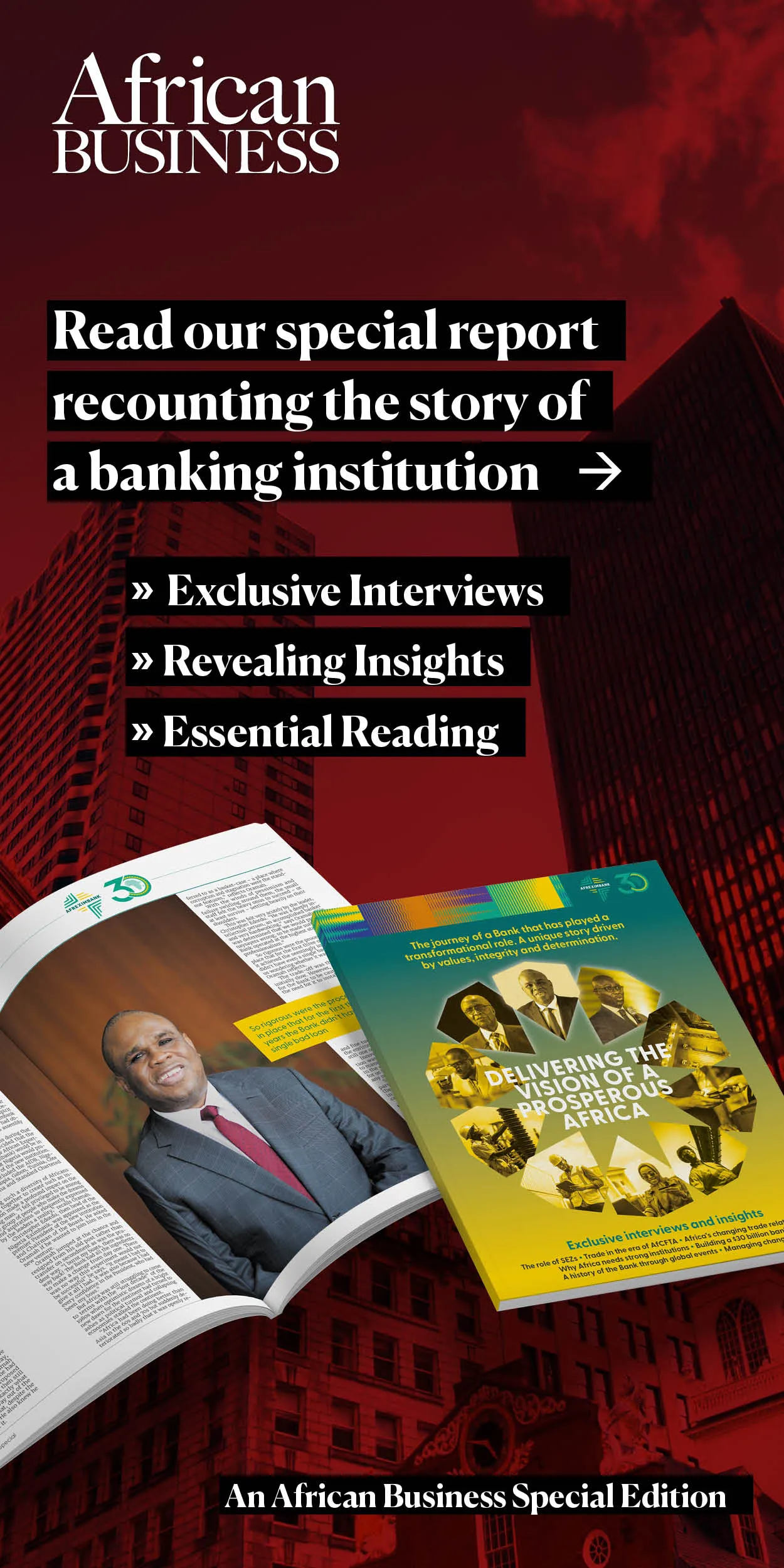This article was produced with the support of Afreximbank
Dr. George Elombi was among the small early band of bright young professionals being assembled by Afreximbank’s first President, Christopher Edordu, when he left his position as a lecturer at the University of Hull, UK, to join the Bank in 1996.
He had been approached by the Bank’s director of legal affairs, Akin Olubadie who told him the newly established pan-African organisation needed someone who was bilingual, a lawyer and had some understanding of trade finance, all qualities that Elombi had.
Drawn by the Bank’s mission and some encouragement from his cousin who wanted to know what Elombi was doing in the UK when Africa needed its people back home, he accepted. “I walked into the office (in Cairo) and was immediately given a file to start working on. There was no time to go and introduce myself to the HR department. They took note of the fact that I was sitting somewhere and later they came round to take my details,” he recalls.
Elombi who has been able to study the Bank’s history and transformation from a front row seat, recalls that in the early days, sceptics gave it no more than five years before it would implode. But the Bank would not only confound these predictions, it would evolve into one of the most impactful institutions on the continent.
A lot of credit, Elombi says, must go to Christopher Edordu, its first leader. “I think it was lucky for the shareholders that they chose someone who had extraordinary amounts of experience and integrity to lead the Bank from the start. He was a patriotic African who did the work that had to be done quietly and diligently.
“He was also very conservative. If it was necessary, he would spend a day or couple of weeks debating a matter, arguing his position so that we could get it right when a decision was taken. It was values such as these that he instilled in the Bank and which are still evident today.
One of those values was to defend the interests of African countries fearlessly and consistently but with integrity at all times. There were times that this meant thinking ahead and devising creative solutions even before the problems actually arose.
One particular incident stands out in his mind. “There was a time in 1998, before the crisis in Zimbabwe had really started, when Mr Edordu called a few of us for a meeting one evening. He told us that he could see a problem coming in Zimbabwe because the government there had put its finger on something that was extremely sensitive and if care was not taken, there could be an economic catastrophe. And this was an economy that at the time was extremely successful.
“He felt that we could not allow this economy to collapse because of politics so we immediately got to work on some schemes to help the Zimbabwean economy to stay afloat.”
In Edordu’s view, politics and politicians had to be seen as separate from the economy, which is eternal and must be preserved for the sake of citizens.
The discussions around Zimbabwe, Elombi says, reflect the collegiality that began under Edordu and continues to prevail at the Bank. No matter how junior a member of staff is, they can be sure of getting the ear of the most senior officials.
“You could, as a junior member of staff, call the president at 2am and tell him you disagreed with something he had said at the credit committee meeting and he would wake up and have a proper conversation with you about it. And if you couldn’t come to an agreement, he would invite you to come to his office later, where there may be a couple more people to discuss the issue and resolve it one way or the other.”
That culture of frank and open debate was critical to the success of the Bank, especially in the early years, with members of staff encouraged to contribute and defend their ideas to improve the quality of decisions and decision-making at the Bank.
The three phases
Elombi breaks down the Bank’s history into three chapters. The first, Edordu’s tenure was the establishment phase, marked by a determination to ensure that shareholders’ funds were protected and the Bank was properly grounded.
“He spent a lot of time impressing upon us that our primary purpose was to secure every dollar for our shareholders. He said if we felt that we could not deliver on that mandate, then we should return all the money to the shareholders with a nice letter explaining that we were incapable of achieving the objectives they [the shareholders] had set for us, And in the first 10 years Afreximbank operated without a loss, which is quite unique.”
The unintended consequence of this success was that the Bank became very important to a lot of people, leading to a shareholder dispute that threatened the Bank’s next chapter, which Elombi describes at the “resilience phase”.
This chapter, largely under the leadership of the Bank’s second President, Jean-Louis Ekra, was also characterised by the Bank establishing itself as a key actor in the African development space. It was during this phase that it established initiatives such as AFRICOIN as well as playing a critical role during the Global Financial Crisis.
Having survived – and thrived – in this era, as well as having shown its mettle, relevance and systemic importance, the Bank was now set for more expansive growth which continues to the present.
“This phase is characterised by the very rapid growth in the balance sheet as well as a change in the structure of the kinds of businesses that the Bank is financing. We have now moved from just trade finance to supporting trade enabling infrastructure.”
This is a transformation that Elombi says was anticipated by the Bank’s founders, who realised that the Bank first needed to build its capacity before tackling its ultimate objectives. Created in a time of crisis, it has become quickly obvious that the structure of Africa’s growth was responsible for the low growth and that it had to be transformed if the continent was to achieve sustained, accelerated growth.
“Our direction of trade was mainly towards Europe because we were just trading in commodities – oil from Angola, Nigeria and a few others with other countries also exporting some minerals. If we were to increase intra-African trade, as we needed to, then we would have to produce goods that Africa needs. That is why changing the structure of trade is now one of the key areas of focus for the Bank in its current, third phase.”
“This is a realisation of the Bank’s grand agenda, as articulated by its first President who had said that the Bank would not be achieving its mandate if it stayed solely in the trade finance sector.
“That means supporting the sea and land ports; the telecommunication infrastructure and the processing plants that will enable African businesses to add value to its raw materials and move it to other parts of the continent – which now has been made much easier by the African Continental Free Trade Agreement,” he says.
The Bank’s growth has meant bringing in more hands to carry its increasing burdens. Currently, the Bank has a core staff of over 300 and soem 600 consultants, support staff and other outsourced agents working on its behalf.
Companies of this size can often become overwhelmed with process and routine, leaving them incapable of moving swiftly. “And the nature of the task it has set itself means that Afreximbank must move with speed,” says Elombi. The Bank’s answer to this is to have separate units that address specific parts of its mandate.
“We are beginning to think that the Bank should have autonomous entities that function on their own. That is why you can see the creation of entities such as the Fund for Export Development in Africa, Pan-African Payment and Settlement System, AfrexInsure and others. It’s because if we keep all these in one entity called Afreximbank, it will become too heavy to deliver.
“I believe that could be the final stage of our evolution and also how we can maintain our visibility and relevance to member states.” Smaller units, Elombi argues, will be able to react quickly to challenges.
Independence of the Board
Credit for Afreximbank’s unique strengths and ability to move with the speed of a private sector entity but with the weight of a multilateral, must also go to its founding instruments, which Elombi says are some of the “most creative legal instruments” he has ever seen.
The founders of the Bank created an institution that was partly owned by government agencies and partly by private sector players. So, unlike classic multilaterals which have only a treaty that countries sign onto, Afreximbank also has a charter to regulate the relationship between the Bank and its shareholders, which include private sector bodies.
“The creativity of this arrangement and the interplay between the two documents have made it possible for the Bank to have all the benefits of being a multilateral while at the same time retaining an ability to function like a private sector institution.
“It has to declare and distribute dividends and that means it has to have private sector discipline in its operations; and it also has to achieve development at the same time.”
The founders were also careful to distinguish the Bank from other multilaterals on the allocation of power to shareholders. “Voting power of the board is not indexed to the size of shareholding. Each shareholder gets only one seat and one vote, no matter the size of their shareholding. That was another ingenuity intended to give the board and management a certain independence so that they are able to make decisions without the control of the larger shareholders.”
So independent is the board that once it is appointed, shareholders cannot unilaterally recall a representative, meaning that they can dedicate themselves to the interests of the Bank without looking over their shoulder for the approval or otherwise of the entity that put them there.
For stakeholders outside the Bank, this took some getting used to. Lenders were unsure how to treat this unique hybrid organisation, while the Bank itself had to maintain a tight balance in order not to lose any of the benefits that come from having one foot on either side of the public-private sector divide.
Owing to its unique character, the Bank is not directly regulated by any of the usual bodies. When it came to ratings, typical for private sector lenders of its size, a huge debate raged in the Bank for about two years. “Edordu, as President, was convinced that it was not necessary for the Bank to submit itself to the ratings process, while other members of senior management at the time felt differently,” Elombi recalls.
Some of the hesitation was derived by the institutional shortcomings of the ratings system and how that would affect the Bank’s development objectives. “These agencies are coming from a different part of the world where Africa is only seen in terms of risk, despite the fact that African countries default less than countries in other regions,” he points out.
“However, because we have to rely on the international markets for finance, we have to submit to these agencies because we need their blessings. So it’s a complex relationship we have with these agencies,” he says. “That is why at Afreximbank, we thought of turning to mobilising funds from African sources, which fortunately, we have been very successful in.”
In the end, a compromise was reached where the agencies were invited to assess the Bank’s processes and get accustomed to its unique character before the Bank formally submitted itself for a rating.
Source of resilience
The Bank’s resilience in the face of crisis, Elombi says, can be traced to the circumstances of its birth. Created in the midst of challenges to fix challenges, the Bank owes its existence to the will of countries to find the money for equity to fund it.
That it was forged in such difficult circumstaances makes the Bank naturally adept at facing challenges, he argues, pointing to the Bank’s balance sheet, which has continued to grow in spite of the ongoing global economic downturns which have weakened the capacity of even larger financial institutions.
He points to the Bank’s response to the Covid-19 pandemic as a demonstration of its characteristic adeptness in times of emergency. “Covid was considered a major threat across the world and it required a lot of courage to address it. We didn’t have any vaccines and everyone thought there would be carnage in Africa.
“So we went to the board to ask for $2bn and they had only two questions. One was about the mandate – and that was easy because Afreximbank was also created to carry out trade financing for essential imports and Covid vaccines were clearly essential imports. If you didn’t protect the lives of your citizens, there would be no trade to finance.
“The other question was about liquidity, how would we find the money? Fortunately, the loans were such that
we could easily move liquidity from one side to the other and we were able to go to the market to raise money at a time when there wasn’t much money in the market.”
While Elombi is confident about the Bank’s ability to face massive global ruptures, he believes that much will depend on keeping the employee corps focussed on the Bank’s overarching ambitions.
“My fear is that staff may stop to see themselves as development agents and come to think of themselves as bankers. First and foremost, we are development agents. Banking is merely the tool that we are employing to achieve our development objectives.
“This is a message that risks being diluted as more people join the team and the sheer scale of the day-to-day financing tasks come to dominate all our attentions.”
The way to address this, he says, is to consistently imbue new staff with a sense of mission and to drive home the understanding that the Bank’s relevance to its shareholders is the one thing that defines and secures its very existence.
Staff at the Bank, he says, must never forget that the continent needs them to succeed and it is a privilege to be among the few people tasked to drive the Bank’s mission. That requires them to be relentlessly focussed on the continent’s challenges and efforts to address them.
“You cannot relax when there are parts of the continent where there are no roads, no power, no telephone networks. There is a lot of work that remains to be done,” he concludes.


 Sign in with Google
Sign in with Google 
